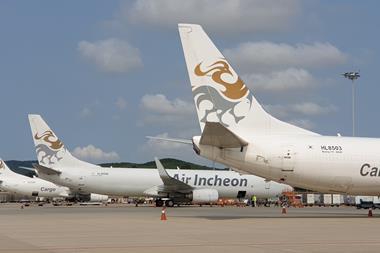On 30 August, Air China announced its intention to sell its 51% stake in Air China Cargo to sister unit Capital Holding in light of uncertainties in international trade.
Once the RMB2.4bn ($357m) transaction is completed, Air China Cargo will no longer be a subsidiary of the Beijing-headquartered airline. Capital Holding will own 51% of the cargo airline, with Cathay Pacific owning the remaining 49%.
Capital Holding is a wholly-owned subsidiary of state-owned China National Aviation Holding Corporation (CNAHC), which is also a 53.5% shareholder of Air China.
Air China gave two reasons for the disposal of its freight-carrying subsidiary: “With the increase in the income of residents, the upgrade of consumption structure, and the increasingly close economic tie among regions, the air passenger transport business maintains stable growth while possessing huge market potential.
“Following the disposal of Air China Cargo, the Company will further concentrate its resources on the air passenger transport business to increase the competitiveness thereof while mitigating the impacts of intensified competition in the cargo transportation market and uncertainty of international trade situation on the Company’s business performance”.
Besides facing fierce competition and tight profit margins, Air China Cargo continues to act as a provider of airport-to-airport transportation in a marketplace where customers are increasingly seeking a single end-to-end logistics provider, and its parent carrier said measures to transform the business in line with this trend would be costly and slow to yield results.
Air China Cargo’s profitability improved in 2017, “mainly due to the recovery of international transportation volume, cyclical rise of freight rates, and substantial exchange rate gain from the appreciation of Renminbi against US dollar”, the airline said.
In the first half of 2018, cargo revenue was up by 13.1% year on year as the global economy continued to recover. Air China Cargo’s capacity increased by 9.6% to just over 7 bn AFTKs while RFTKs increased by 8.4% to 3.8 bn. The cargo and mail load factor fell slightly, by 0.61 percentage points, to 54.48%.
But despite the recent positive financial results, Air China said: “Given the complex international trade situation and the expected weakening of Renminbi, the profitability has not been fundamentally improved. Due to the extended period of poor performance, there is still a large amount of losses to be covered.”
As reported by Air Cargo News in April, Air China is carrying out mixed-ownership reforms as the Chinese government seeks to open up state-run companies to the private sector, so that the state will be a stakeholder rather than an operator of such companies.
Last year, China Eastern completed a similar deal as it offloaded its freighter operating arm.
Read more freighter operator news









